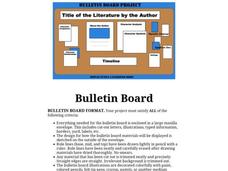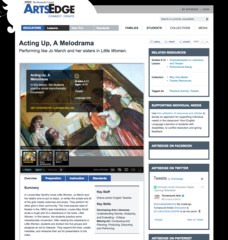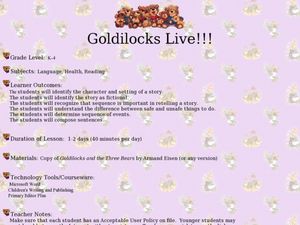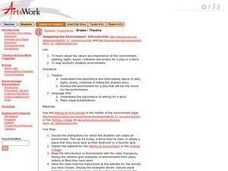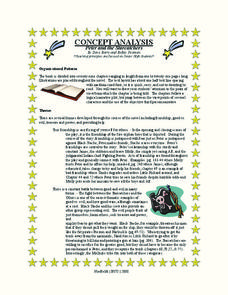Curated OER
A Modest Proposal: Irony Made Understandable with Rock and Roll
Who doesn't love music? Poems and songs will engage your high school class in a discussion about irony. Use songs like "Rockin' in the Free World" or "Born in the U.S.A." to illustrate the ironic point of view. Print the lyrics so...
National Endowment for the Arts
Teacher's Guide: The Great Gatsby by F. Scott Fitzgerald
A 10-lesson unit takes high schoolers through a novel study of F. Scott Fitzgerald's The Great Gatsby. To start, students learn about Fitzgerald's background and gain historical context that prepares them for a reading of the book. The...
Sandra Effinger
Bulletin Board Project
Imagine a project that informs and entertains. Replace book reports with a bulletin board that highlights all the important elements of a novel. Readers research the author, create a timeline of events in the story, write a...
Novelinks
The Adventures of Tom Sawyer: Concept Analysis
Ready yourself for The Adventures of Tom Sawyer with this analysis of the novel. Included here is a summary of the plot, a list of themes, notes on vocabulary and other issues, a brief analysis of plot elements, and project ideas...
Reed Novel Studies
The Homework Machine: Novel Study
Do opposites really attract? The D Squad in The Homework Machine includes of a quad of opposites. The group, made up of a teacher's pet, a geek, a class clown, and a slacker, make use of a machine to do their homework. In response...
Orlando Shakes
The Best of Enemies
History comes to life with the play The Best of Enemie. Scholars learn literary elements as well explore racial issues in American history. The play is based on a true story and addresses the universal truth that people are capable of...
K20 LEARN
Writing An Argumentative Paragraph: Argumentative Writing
Learning how to craft a cogent argument based on a solid claim, supported with evidence and solid reasoning, is an important life skill. Teach middle schoolers about argumentative writing with a instructional activity asking them to...
Curated OER
Understanding Character
Readers practice character analysis by reviewing Gary Soto's short story "La Bamba" with the whole class (anything you've read together will work). They design t-shirts that feature traits and story elements to reveal the nature of a...
Curated OER
Chocolate Chaos
Second graders demonstrate the ability to examine the elements of a story (theme, plot, setting, mood) and characters, by discussing and writing about each. They have fun with chocolate related activities and enjoy reading about some...
Curated OER
Cultural Creation Myths
Students write original plays based on supernatural explanations of existence. In this cultural creation myths lesson, students listen to five different stories about supernatural creation. Students record similarities and differences in...
Curated OER
Holes
Students read and analyze the story elements of the novel "Holes" by Louis Sachar. They play a "Holes" matching game, complete a timeline of story events, complete a Cause-and-Effect graphic organizer, conduct research on Louis Sachar's...
John F. Kennedy Center
Acting Up, A Melodrama: Performing Like Jo March and Her Sisters in Little Women
Lights, Camera, Action! Pupils read Little Women and create, act, and direct a melodrama that Jo March and her sisters would enjoy. The lesson plan comes complete with resources for the educator on melodrama as well as examples...
Curated OER
The Great Kapok Tree- Teaching About Conflict in Literature
Learners identify the plot of a text. In this literature lesson plan, students listen to the book The Great Kapok Tree and identify the problem and solution. A graphic organizer is used to help reinforce the concept.
Curated OER
Exploring the Mystery Genre
Students determine the story elements of typical mystery stories including characters and plot structure. They look at vocabulary that is common to mystery stories before reading and responding to mystery chapter books. Working in guided...
Curated OER
Introduce: Summarizing Narrative Text
When scholars re-tell a story, do they boil it down to important details in a logical order? Practice summarizing narratives using this think-aloud strategy, which is scripted here for your convenience. After explaining why this is an...
Curated OER
Goldilocks Live!!!
Study story elements with your young learners. Read Goldilocks and the Three Bears and discuss the order of events by making a story panel out of butcher paper. Sentences are given as suggestions for the panel, though you may...
Curated OER
Creating a Found Poem
Teach your English learners about theme through this found poem project. Class members read two versions of O. Henry's "The Gift of the Magi": the original version and a synopsis. After learning about themes and connecting theme to their...
Curated OER
Puss in Boots/Jamil and the Clever Cat
Second graders read the story PUSS IN BOOTS identifying main characters, setting, and significant events. They then read the story JAMIL AND THE CLEVER CAT and compare it with the story PUSS IN BOOTS compiling a list of characters,...
Curated OER
Imagining the Environment: Introduction
Students examine the importance of the environment including the setting, lights, sound, costumes, and props for a play or story. They visualize the appropriate environments and practice applying the techniques.
Curated OER
Peter and the Starcatchers: Concept Analysis
Are you preparing to teach Peter and the Starcatchers? If so, you'll want to take a look at this analysis of the text, which describes plot and literary elements in-depth and explores potential implications related to diversity and...
Curated OER
The Boy Who Cried Wolf
Second graders listen to the story, THE BOY WHO CRIED WOLF and in pairs, discuss the theme of the book and two things that they liked about it. They then read the book OOPS and discuss the theme of the book identifying the things they...
Curated OER
Teaching With Pourquoi Tales
Students read and discuss several Pourquoi tales--legends that explain why certain natural events occur. They complete a variety of activities surrounding each tale and then write their own Pourquoi tale.
Curated OER
Cops and Robbers
Second graders observe the teacher model writing a letter to the author of the book, COPS AND ROBBERS. They then compare the story structure of the book to those of FUNNYBONES and identify the setting, characters and theme.
Curated OER
The Sand Horse
Fourth graders are introduced to the book THE SAND HORSE and discuss the title and cover illustration. They listen to the story listening for words and phrases to describe the setting. They then brainstorm key words to illustrate the...




